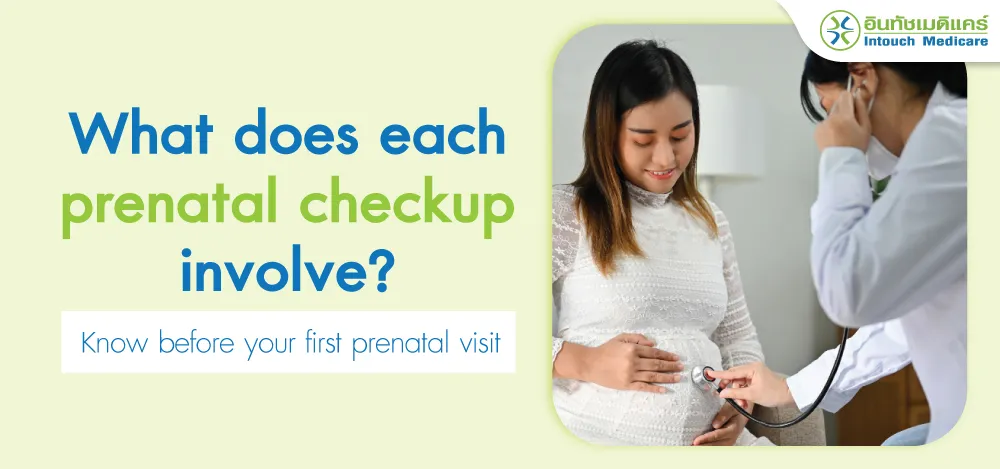What does each prenatal checkup involve? Know before your first prenatal visit

"First prenatal visit: What does it involve?" "What is included in each prenatal visit?" These are common questions for many new mothers who are unsure about what to expect during pregnancy check-ups. Going for prenatal care is a new experience that can cause anxiety, especially regarding the specifics of the first visit, what the doctor will examine, and how much it will cost.
Mothers who read this article to the end can rest assured that their questions will be answered, easing their worries about their first prenatal visit. They will be well-prepared to attend prenatal appointments at a nearby obstetrics clinic.
What does each prenatal visit involve?

First Prenatal Visit
For the first prenatal visit, it is recommended to visit a Prenatal clinic or hospital near your home for convenience. You will need to go for several check-ups during pregnancy. What does the first prenatal visit involve? Here are the details:
Taking Mother's History
During the first prenatal visit, the doctor will gather and review basic information about the mother. This includes the first day of her last menstrual period, personal medical history of family members, any medications or supplements she takes, and her lifestyle habits. This assessment helps evaluate her health and provide appropriate guidance.
Physical Examination
During the first prenatal visit, the doctor conducts a detailed physical examination of the mother. This typically begins with measuring weight and height to assess the natural childbirth feasibility. Subsequently, vital signs are checked, followed by a comprehensive physical examination, including examination of the mouth and teeth, breasts, and abdomen palpation to identify any other health issues. Additionally, an examination of the cervix and uterus is conducted.

Mother's Blood Tests
Blood tests are crucial during the first prenatal visit to diagnose blood type (ABO) and Rh factor, immune system infections, and other infections.
Rh Factor (Rhesus, Rh) and Disease Screening
Blood tests help detect various infections such as hepatitis B virus (HBV), syphilis, and HIV.
Urine Sample TestingThe doctor collects a urine sample to screen for other infections.

Father's Blood Tests
In addition to the mother's tests, testing the father's blood is equally important. This helps determine if the father's health is robust or if he has any communicable diseases that could affect the mother and baby, such as syphilis, hepatitis B, or genetic disorders like thalassemia.
The doctor assesses this on a case-by-case basis particularly if the mother's blood results are abnormal, there is an infection, or there is a risk of severe genetic diseases affecting the baby.
Purchasing Prenatal Vitamins
Every mother needs to receive prenatal vitamins as appropriate throughout their pregnancy, following the prenatal care plan provided by the obstetrician. These include folic acid, folate, vitamin B9, iron, calcium, and a multivitamin. It's important not to take any medications or vitamins other than those prescribed by the doctor, as various supplements are already present in the mother's diet.
|
Ultrasound Scan
During pregnancy and prenatal care, ultrasound scans help the doctor analyze the overall image of the fetal body. It also helps determine the baby's gender using high-frequency sound waves to create images of the fetus in the womb.
Measuring Fetal Growth
Another important aspect of prenatal care is measuring fetal growth. The doctor will assess fetal growth by measuring the expanding size of the abdomen at various stages of pregnancy.

Listening to Fetal Heartbeat
During the second trimester prenatal check-up, usually around 20 weeks of pregnancy, the doctor will use a Doppler ultrasound device or a stethoscope to listen to the baby's heartbeat. This helps them monitor the rhythm of the baby's heartbeat and interpret it into audible sounds.
Generally, doctors can hear the fetal heartbeat around 10-12 weeks of pregnancy.
Assessing Fetal Movements
By the time the pregnancy reaches around 20 weeks, the fetus often starts moving and kicking inside the womb. Some mothers who have been pregnant before may notice fetal movements even before the 20-week mark. It's important to inform the doctor if there are any concerns about fetal movements.
Checking Fetal Position
As the due date approaches, usually in the last trimester, the doctor will measure the baby's weight and check if the baby's head is positioned towards the birth canal. If the baby's head is not in the correct position, the doctor will explain the risks and may recommend a cesarean section, often guided by ultrasound to check the amniotic fluid levels.

High-Risk Pregnancy Due to Miscarriage
Miscarriages often occur within the first 20 weeks of pregnancy. Symptoms may include cramping in the lower abdomen similar to menstrual cramps and vaginal bleeding. These signs indicate a risk of miscarriage, and it's essential to promptly seek medical attention.
Doctors will investigate the causes and risk factors that could lead to miscarriage. They will then plan and manage the pregnancy accordingly, based on identified risk factors and causes.

Pregnancy at Risk of Diabetes
If there is a risk of developing diabetes during pregnancy, doctors will screen for gestational diabetes using the 50-gram glucose challenge test. If results are abnormal, they will confirm the diagnosis with the 100-gram glucose tolerance test.
Additionally, doctors will recommend lifestyle modifications to reduce the risk of developing diabetes during pregnancy. This may include reducing carbohydrate intake, avoiding or minimizing high-sugar foods, controlling weight gain within recommended limits for pregnant women, and engaging in appropriate exercise.

Down syndrome screening
Down syndrome can occur in any pregnancy and at any maternal age. Therefore, healthcare providers recommend that all mothers undergo Down syndrome screening, especially in high-risk pregnancies. High-risk factors include maternal age over 35, previous pregnancies with Down syndrome, a family history of Down syndrome, or findings from ultrasound indicating characteristics of Down syndrome.
Early screening for Down syndrome is crucial to assess the risk and prepare for appropriate care.
You can see that prenatal care varies in steps and details, but it benefits both the mother and the baby by providing insights into the various developments of the baby and potential risks during pregnancy.
For your first prenatal care visit, there's no need to worry anymore once you've read through to the end of this article, right? Because you can now understand what each prenatal care visit entails. Each topic discussed will help alleviate your worries, excitement, and better prepare you before going for prenatal care.
Interesting Articles
For more info and make appointment
hotline 081-562-7722
Compiled by Dr.Warangkanang Wiwatsirikul
Last updated: 04/07/2024
Permission is granted to use the images without seeking further authorization, exclusively for educational or informational purposes. Please provide credit or cite the source as intouchmedicare.com


